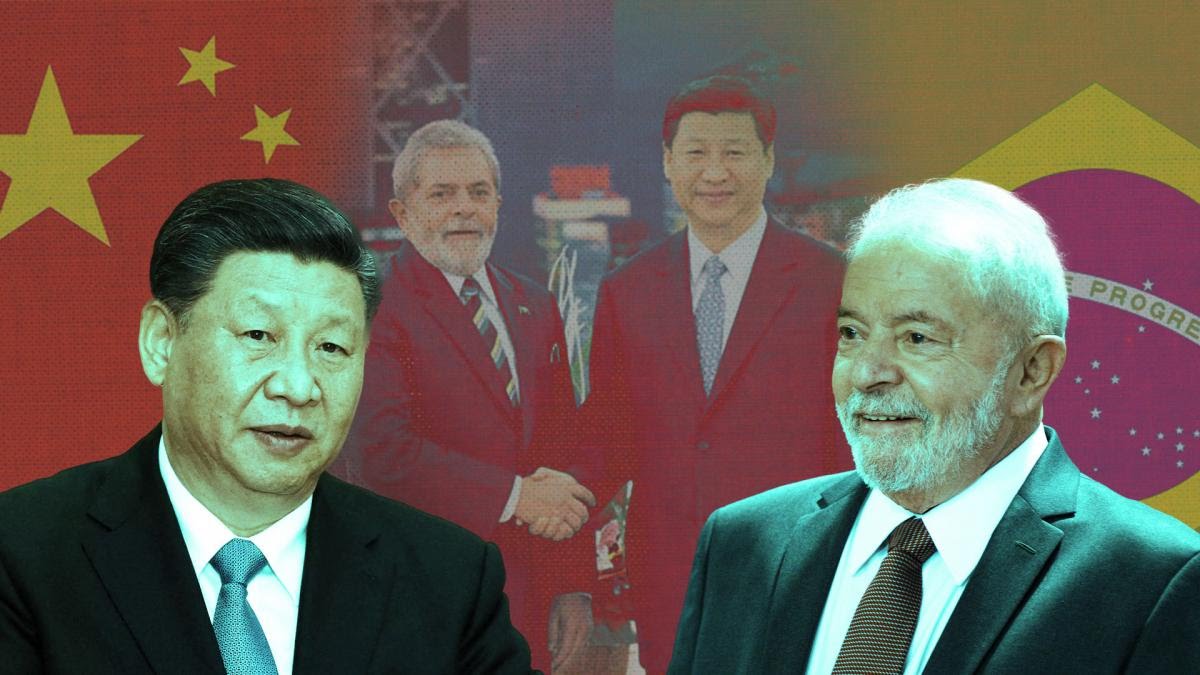With a state visit on Friday, Brazil reestablished diplomatic ties with China, its top economic partner.
During the visit, they decided to increase investments and collaboration in technology and sustainable development while promoting peace talks in Ukraine.
The agreements were signed in Beijing with President Xi Jinping and other Chinese officials by Brazilian President Luiz Inacio Lula da Silva and a number of his ministers.
According to Xi, China has made relations with Brazil a diplomatic priority, and the two nations should expand their practical collaboration in industries including agriculture, energy, and building infrastructure.
Prior to his meeting with Xi, Lula declared, “We have a remarkable connection with China, a friendship that every day sharpens and strengthens.
He continued that Brazil and China must cooperate to ensure that their relationship goes beyond only business interests.
According to a joint statement, the two presidents concurred that communication and diplomacy are the “only practical way” to end the conflict in Ukraine.
They made an appeal for other nations to actively support a political agreement between Ukraine and Russia.
Following four years of tense relations with China under his far-right predecessor Jair Bolsonaro, when commerce was unaffected but Chinese business investment declined, Lula paid a visit to China.
The two nations decided to increase cooperation in environmental protection and addressing climate change.
As a new area of priority for bilateral ties, and will form a committee for this in their strategic partnership discussions.
They decided to take joint action on climate challenges in international fora while urging more funding for sustainable development initiatives.
However, there was no agreement on a bilateral green investment fund that Brazil was expecting would finance and support the development of renewable energy.
China pledged to supporting clean energy and green hydrogen production in Brazil.
In order to advance their semiconductor collaboration, China and Brazil did agree to form a working group. This strengthened relations with Beijing in critical technological fields.
Information technology has been a source of friction between China and the United States and European nations, which have occasionally imposed import bans on Chinese goods due to security concerns.
Despite pressure from the U.S. administration in recent years discouraging the use of fifth-generation mobile equipment from tech giant Huawei Technologies. Brazil is still keen in luring Chinese investment to these regions.
Despite pressure from the U.S. administration in recent years limiting the use of fifth-generation mobile equipment from tech giant Huawei Technologies, Brazil is nonetheless interested in luring Chinese investment in these sectors.
According to officials, Brazil is interested in developing the technology with China and is open to the building of a Chinese semiconductor facility there.
Lula visited Huawei’s research facility in Shanghai on Thursday and received a technical briefing while using a virtual reality headset.
Speaking in front of the public in Beijing, Lula stated that his visit to Huawei was “a demonstration that we want to tell the world we don’t have prejudices in our relations with the Chinese.”
Nobody will stop Brazil from strengthening its ties with China, he continued.
On Friday, the two countries agreed to encourage their companies to invest in each country in infrastructure, energy transition, logistics, mining, agriculture and high-tech industries.
Brazilian Finance Minister Fernando Haddad said the two were deepening studies to conduct trade in local currencies. Noting that the idea of lowering dependence on the dollar had long been on the agenda of the BRICS group of major emerging nations.
Brazilian President Michel Temer, whose administration recently reached its 100-day mark. Has been working to repair the country’s alliances, many of which were put to the test by his far-right predecessor, Jair Bolsonaro.
According to experts, Lula is attempting to “carve out a distinctive role” for Brazil in world geopolitics by maintaining relations with Washington as well as with its adversaries, like China and Russia.
On Wednesday, Lula and a sizable group that included 240 Brazilian business leaders and dozens of political figures were scheduled to arrive in China.
The fact that President Lula da Silva will head a sizable delegation on his state visit to China so soon after his recovery demonstrates the high priority both sides place on this trip.
Moreover, our bilateral relations, said Wang Wenbin, a spokesman for the Chinese foreign ministry, at a news conference on Tuesday.
“China stands ready to cooperate with the Brazilian side and take this visit as an opportunity to strengthen.
The mutually beneficial cooperation in various sectors and infuse more positive momentum into the solidarity, cooperation, and shared response to global challenges among developing countries.”
Additionally, he continued, Brazil “has significant long-term strategic interests in maintaining a cooperative relationship with China.”
According to a briefing paper published on April 6 by S&P Global Market Intelligence analysts Ailsa Rosales and Alejandro Duran Carrete, bilateral commerce between China and Brazil will reach $150 billion in 2022, up 10.1% from the previous year.
According to data gathered by the Observatory of Economic Complexity, Brazil mostly sends iron ore, soybeans, and crude oil to China.
While the majority of Chinese exports to the Brazilian market are semiconductor devices.
According to Rosales and Duran Carrete of S&P, negotiations during Lula’s visit to China are also anticipated to “cover state cooperation, including strengthening technological knowledge sharing and the construction of a satellite to support Amazon conservation”.
According to them, “China-Brazil relations are likely to remain a key component of President Xi’s foreign policy, which has emphasised securing trade routes.
And building strategic alliances with emerging economies through signature initiatives.
Such as the Belt and Road Initiative and the Global Development Initiative, of which Brazil is not yet a formal member.”
















